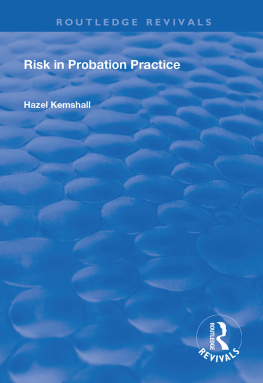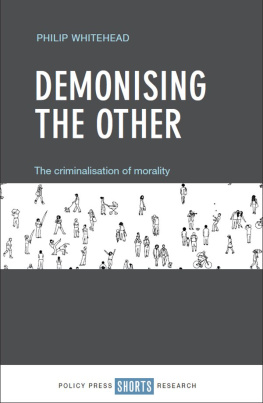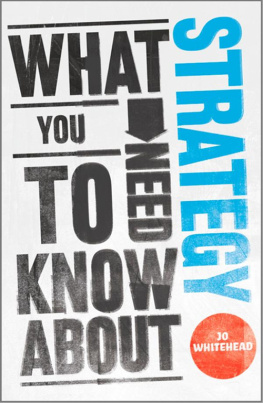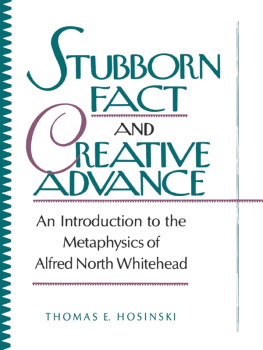TRANSFORMING PROBATION
Social theories and the criminal justice system
Philip Whitehead
First published in Great Britain in 2017 by
Policy Press University of Bristol 1-9 Old Park Hill Bristol BS2 8BB UK Tel +44 (0)117 954 5940 e-mail
North American office: Policy Press c/o The University of Chicago Press 1427 East 60th Street Chicago, IL 60637, USA t: +1 773 702 7700 f: +1 773-702-9756 e:
Policy Press 2017
British Library Cataloguing in Publication Data
A catalogue record for this book is available from the British Library
Library of Congress Cataloging-in-Publication Data
A catalog record for this book has been requested
ISBN 978-1-4473-2766-0 paperback
ISBN 978-1-4473-2765-3 hardcover
ISBN 978-1-4473-2770-7 ePub
ISBN 978-1-4473-2769-1 Mobi
ISBN 978-1-4473-2768-4 ePdf
The right of Philip Whitehead to be identified as author of this work has been asserted by him in accordance with the Copyright, Designs and Patents Act 1988.
All rights reserved: no part of this publication may be reproduced, stored in a retrieval system, or transmitted in any form or by any means, electronic, mechanical, photocopying, recording, or otherwise without the prior permission of Policy Press.
The statements and opinions contained within this publication are solely those of the author and not of the University of Bristol or Policy Press. The University of Bristol and Policy Press disclaim responsibility for any injury to persons or property resulting from any material published in this publication.
Policy Press works to counter discrimination on grounds of gender, race, disability, age and sexuality.
Cover design by Liam Roberts
Front cover image: istock
Readers Guide
This book has been optimised for PDA.
Tables may have been presented to accommodate this devices limitations.
Image presentation is limited by this devices limitations.
List of tables
Acknowledgements
I have incurred many debts of unconditional generosity over nearly four decades, through my association with the criminal justice system and, since 2007, Teesside University. I am indebted to Roger Statham, whom I have known and worked with since the 1980s, as well as many former probation colleagues. I have learned much from David Faulkner, Rob Canton and Mike Nellis. I thank Georgios Antonopoulos, Georgios Papanicolaou and Paul Crawshaw. Evi Boukli and Anthony Lloyd allowed me to share their office, the location for valued conversations. It is right and proper to mention Eric Baumgartner, and other colleagues in the School of Social Sciences, Business and Law, especially the Teesside Centre for Realist Criminology. I owe a considerable intellectual debt to Steve Hall and Simon Winlow, who enabled me to expand and refine the theoretical resources in this revised and expanded edition.
It remains appropriate to mention Judge Peter Fox and all those solicitors, court clerks, magistrates, barristers and crown court judges without whom it would not have been possible to undertake the research retained in this edition. In fact, there remains a paucity of research on these criminal justice professionals.
I must express my gratitude to Ishmael Hussain, MSc student, for checking the in-text citations against the references. This was an invaluable source of assistance during the early part of 2016 that contributed to the completion of the book. It would be remiss of me not to mention Policy Press and their interest in this updated text.
As always, my deepest debt of gratitude is to Carolyn, Alex, Tim and Jenny. My life with them has always been the platform for my probation and academic work.
Finally, I dedicate this book to all those probation colleagues that I have worked with since 1977 those who taught me the history and culture of the organisation, and who operated as the social workers of the courts. Many former colleagues have endured much, too much, over recent years.
Stokesley, North Yorkshire, March 2016
About the author
Philip Whitehead is Professor in criminal and social justice at Teesside University. After studying theology at Manchester University and later qualifying as a social worker/probation officer at Lancaster University, Philip worked for the Probation Service in the North East of England before being appointed lecturer at Teesside University. He has written widely on the history and modernisation of the probation service, co-edited a collection of papers on managerial issues, and co-authored a book on the education of Trainee Probation Officers. His recent books are Organising neoliberalism: Markets, privatisation and justice (Anthem Press 2012), and Reconceptualising the moral economy of criminal justice: a new perspective (Palgrave 2015).
Introduction
The first epiphany of this book was published in 2010: Exploring Modern Probation: Social Theory and Organisational Complexity. It spanned the years from the election of New Labour in 1997 to 2009. The current edition has substantively rewritten, revised and updated the original text. It is chronologically extended to include 19972015, which witnessed the eruption of the rehabilitation revolution. It is also theoretically enriched. Authors are not the best judge of their own work, just as parents are not the best judge of their own children. Nevertheless, I advance the bold, perhaps reckless, claim that this is a better book primarily because of its extended chronology, theoretical additions and refinements.
I have been associated with the probation service since 1977 (approaching 40 years), when I first worked as a volunteer at the Lancaster probation office. One of my tasks was to explore employment opportunities for borstal boys released on licence. Since 1979, the criminal justice system in general, and probation in particular, have been confronted with a series of critical events or hinge moments: in 1979, the conservative government; in 1992/93, prison works; in 1997, New Labour; in 2001, the National Probation Service (NPS); in 2003, the National Offender Management Service (NOMS); and in 2010, the move towards transforming rehabilitation. This book covers the period of the New Labour and Coalition governments, 18 years that culminated in the privatisation of a proportion of probation work by 21 Community Rehabilitation Companies. This politically imposed process was driven relentlessly forward through time, but backward ethically, by the ideological and material interests of neoliberal capitalism and its New Public Management. One serious casualty is the probation service.
I proceed as follows. Chapter One moves around within an extended chronology that embodies the New Labour governments from 1997 to 2010, followed by the Coalition government from 2010 to 2015. The first substantive period disturbingly modernised, the second convulsively transformed, probation services and the criminal justice system. Chapter Two assembles the theoretical resources to excavate and critique developments since 1997: Durkheim, Weber, Marx and Foucault, in addition to the conceptual framework of Lacan and iek that is conducive to organisational analysis and critique. Chapter Three turns to the religious and personalist tradition to promote reflections on the conceptual device of moral economy (see Whitehead, 2015b). This puts into sharp relief the contestation between the ideological and material interests of neoliberal political economy, and the ethico-cultural duties and demands of people facing organisations. Next, Chapter Four puts the extended and refined grid of social theory and moral sensibilities to work to elucidate and critique the thematics of modernisation and transformation. Importantly, Chapter Five retains the substantive research insights contained in the first edition. There remains a paucity of empirical research on solicitors, clerks, magistrates, barristers and judges. This continues to represent a slice of criminal justice history in the north-east of England at what was a critical historical and organisational juncture. I have constructed a new final chapter, Chapter Six, on what can legitimately be described as modernising monstrosities and transformational traumas, in order to expose the penetrative reach of political impositions and associated organisational reconfigurations over 18 years. These monstrosities and traumas have had serious implications for probation staff and their practices: 21 Community Rehabilitation Companies, community supervision, the prison system and the moral foundations of criminal and social justice.












